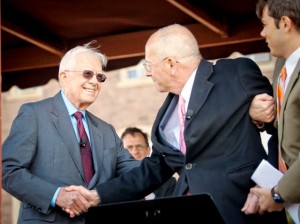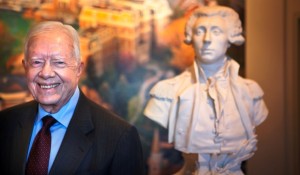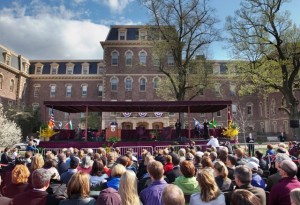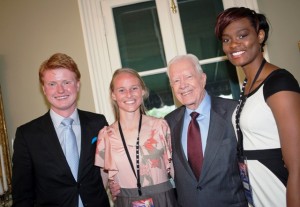
President Jimmy Carter thanks Robert Pastor ’69 for his introductory remarks.
On Monday afternoon Robert Pastor ’69 had his best homecoming ever.
The renowned diplomatic scholar launched an annual Lafayette lecture series in international affairs that he endowed with his wife, Margy. He introduced the first guest speaker, Jimmy Carter, the former president and his former boss. The two ambassadors discussed their global humanitarian campaign on the campus where Pastor started becoming a global citizen. And they strengthened their friendship just 12 days after a cancerous tumor was removed from Pastor’s brain.
This rare alliance took place on a covered stage by Pardee Hall, where Pastor studied world history. Pastor opened the program by describing Carter as a bravely visionary president, an evolution he witnessed as Carter’s national security adviser on Latin America and the Caribbean. He spoke from a wheelchair, his son, Kip, kneeling as he held the pages of his father’s speech, so they wouldn’t scatter in the wind.
View images from President Carter’s visit
View videos chronicling President Carter’s visit
Read a transcript of Robert Pastor’s introduction and Jimmy Carter’s speech
Pastor praised Carter for brokering a peace agreement between Egypt and Israel, the latter’s only peaceful treaty with a Middle East rival. Carter, he pointed out, helped normalize U.S. relations with China, enabling the Communist country to chart an international course, and actively opposed tyranny in all nations, not just ones led by tyrants. Pastor also saluted Carter for promoting climate control and energy regulation by installing solar water-heating panels on the White House—an especially important fact to note on Earth Day.
Carter is “a relentless peacemaker” ruthlessly devoted to ending poverty and powerlessness, said Pastor, who directs American University’s Center for North American Studies and Center for Democracy and Election Management. The 2002 Nobel Peace Prize recipient, Pastor added, is “the greatest man I’ve ever known.”
It was a remarkably passionate, penetrating speech, one that Carter gladly admitted was a very tough act to follow. Carter returned the favor by thanking Pastor for establishing an “aggressive” and “brilliant” human-rights policy during his presidency. It was Pastor, he insisted, who really convinced then-Cuban President Fidel Castro to free nearly 4,000 political prisoners, who closely monitored nearly 650,000 elections in Chinese villages outside Communist jurisdiction, who more than anyone helped change dictatorships to democracies throughout Latin America.
Carter acknowledged Pastor as a key consultant to The Carter Center, a major human-rights ally for more than 20 years. Pastor, he pointed out, helped him bring democracy to Nicaragua and Indonesia. Pastor, he said, has helped him “reach beyond myself.” Reaching beyond himself includes writing 27 books, or 10 more than Pastor has written. Being a more-published author, said Carter with a smile, is “the only thing I’ve ever exceeded Bob in.”
A tribute to Pastor then became a tribute to the Carter Center’s mission to relieve suffering around the world. Carter spoke proudly of eradicating diseases and epidemics in Africa. Providing tens of thousands of latrines in Ethiopia, he noted, has improved health—physical, social, emotional. Women are no longer banned from relieving themselves during the day, which makes the latrine program “a women’s liberation operation.”

President Carter with the bust of the Marquis de Lafayette in Markle Hall
Shifting into the stern tone of an ex-president, Carter criticized American leaders for hawking war. This January he tried to think of places where the United States promoted peace while he traveled to the second inauguration of President Barack Obama. He couldn’t think of one. He posed the same question to John Kerry, who’d been named secretary of state. According to Carter, Kerry drew a blank, too.
During a question-and-answer session moderated by Lafayette President Daniel H. Weiss, Carter scolded U.S. and Israeli leaders for blocking Palestinian officials who belong to Hamas, the terrorist organization, from taking office after being elected. He called the oppression of women “one of the greatest blights.” Peace would be more possible, he declared, if U.S. diplomats would just talk openly with their peers in North Korea, Syria, and elsewhere.
At times the statesman became the comedian. Carter revealed that one of the reasons he likes writing is that he gets to go on book tours, which give him a better platform for expressing his controversial opinions than lecture tours. He also gets to match wits with Jon Stewart on The Daily Show.
After answering the day’s last question, saying that the best lesson he learned in college was using America’s military power to preserve peace, Carter then committed a peaceful deed, wheeling Pastor across the stage.
This act of friendship touched David Stifel, associate professor of economics, chair of international affairs, and a member of the committee that planned Carter’s visit to campus. He was particularly impressed by Carter’s reminder that “a willingness to engage in dialogue can bear fruit” across the world. According to Stifel, Carter is “a great role model” for the “need to talk.”

President Jimmy Carter delivers Lafayette’s inaugural Robert ’69 and Margaret Pastor Lecture in International Affairs on the Quad with Pardee Hall in the background.
Katalin Fabian, associate professor of government and law, was impressed by how Carter has popularized unpopular causes: engaging China as a superpower, empowering women, and championing human rights for every country, including non-allies. She, too, was touched by Carter wheeling Pastor. It was a reminder, she said, that “we do need each other, and the time of need usually appears totally unexpectedly.”
Tanner Flanigan ’14, a double major in government & law and economics, was impressed by how Carter has tried to reduce genocide in countries like Somalia. He wished Carter would have elaborated about why military intervention can be misinterpreted as an act of war. Nevertheless, he said, Carter’s presentation gave him a better idea why his mother, a Democrat, is a Carter fan and why his father, a Republican, is not.
Taylor Dougherty ’13, who is pursuing a degree in psychology and an A.B. with a major in government and law, praised Carter’s “concrete” plans to improve America, which she called a significant improvement on vague “rah-rah” proposals. She agreed with Carter that Americans shouldn’t be threatened by the rise of China to superpower, filling a void left by the former Soviet Union. Diplomacy with China should be viewed as a healthy balance, “not necessarily a lessening of America’s power but an increasing of the world’s power.”
Both Dougherty and Flanigan enjoyed Carter’s humorous tale about a joke he told in Japan that received an unusually rapturous response. Always curious, Carter asked his interpreter how he told the joke. The translation turned out to be hilariously liberal: “President Carter told a funny story: Everyone must laugh.”

Student Government President Michael Prisco ’14 (left-right), Kelly Senters ’13, President Carter, and Samantha Jordan ’13
Carter ended his visit to Lafayette by dining with six students, among other guests, in the President’s House. Michael Prisco ’14, who is majoring in international affairs, history, and Africana studies, relished the ex-president’s warmth, wit, and genuine interest in the lives of undergraduates. “He is a fountain of information,” said the president of Student Government, “that never quite stops flowing.”
Carter’s visit concluded a remarkable month in which Lafayette hosted speeches by three world leaders, each of whom concluded their visits with remarkably friendly gestures. Jane Goodall, the primatologist and animal-rights advocate, ended her April 11 appearance by signing copies of her books for hundreds of fans. Tony Blair, former British prime minister and current human-rights activist, capped his April 8 mini-summit by posing for photographs with more than 100 people.
Carter was the first former U.S. president to visit Lafayette since George H.W. Bush, who spoke and received an honorary degree at the 163rd Commencement in 1998. Carter’s legacy, however, has been studied at the College for five decades. His foreign policies have long been a staple of courses in international politics and Middle East politics. Students in a course on federalism examined his comprehensive urban strategy for the federal government. Students in a First-Year Seminar explored his role in the 1979-81 Iran hostage crisis, which ended the last day of his presidency.
This synchronicity pleases Bob Pastor, who helped make Carter’s presidency quite phenomenal and quite pivotal. During a phone interview April 9, the day before he had brain surgery, he said he established the lecture series in international affairs to reward Lafayette for making him aware of international affairs. He expects that Carter’s speech will “switch on” the minds of students the way his undergraduate mind was “switched on” by speeches by consumer watchdog Ralph Nader and Yippie leader Jerry Rubin. “I want to give them an opportunity to listen to people who have influenced the world,” he said, “in the hope that one day they can influence the world.”




4 Comments
Comments are closed.